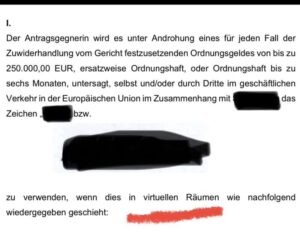No products in the cart.
Webinar on DE-minimis computer game promotion
On June 14, the Federal Ministry of Transport and Digital Infrastructure will offer a webinar on de minimis funding from...
Read moreDetailsThe topic of metaverse is currently on everyone’s lips. Many companies are developing metaverse scenarios or corresponding products, and the press is abuzz with the buzzword metaverse.
I also look after clients in this regard and deal with the topic. Even if one can actually be of the opinion that every computer game is or was in fact a metaverse. What else?
However, the issue is slowly gaining traction with courts and in the legal literature. However, the fact that trademark law also applies in the metaverse, or as courts sometimes call it, in “virtual spaces” has now been decided by the Düssel Regional Court in a preliminary injunction in a trademark case.

This should be one, if not the first court decision that decides on the topic of “virtual spaces”, at least in the Metaverse environment, and uses such “wording”.
It will be interesting to see what happens next, because the topic of NFT (for example, of branded clothing, etc.) in virtual worlds/metaverse scenarios is a big business topic right now, but at the same time also a topic where many companies underestimate the many legal issues, including the topics of supervisory law and BaFin.
Marian Härtel ist Rechtsanwalt und Fachanwalt für IT-Recht mit einer über 25-jährigen Erfahrung als Unternehmer und Berater in den Bereichen Games, E-Sport, Blockchain, SaaS und Künstliche Intelligenz. Seine Beratungsschwerpunkte umfassen neben dem IT-Recht insbesondere das Urheberrecht, Medienrecht sowie Wettbewerbsrecht. Er betreut schwerpunktmäßig Start-ups, Agenturen und Influencer, die er in strategischen Fragen, komplexen Vertragsangelegenheiten sowie bei Investitionsprojekten begleitet. Dabei zeichnet sich seine Beratung durch einen interdisziplinären Ansatz aus, der juristische Expertise und langjährige unternehmerische Erfahrung miteinander verbindet. Ziel seiner Tätigkeit ist stets, Mandanten praxisorientierte Lösungen anzubieten und rechtlich fundierte Unterstützung bei der Umsetzung innovativer Geschäftsmodelle zu gewährleisten.
On June 14, the Federal Ministry of Transport and Digital Infrastructure will offer a webinar on de minimis funding from...
Read moreDetailsUp to now, it has been the rule rather than the exception in competition law and copyright law that in...
Read moreDetailsThe sale of mobile games or even in-app sales of computer games via app stores constitutes a service commission under...
Read moreDetailsIntroduction - definition and understanding of terms Smart contracts are a form of automated agreement that are increasingly being used...
Read moreDetailsIntroduction Currently, the DOSB's decision on esport is being discussed very controversially. I would also like to take this opportunity...
Read moreDetailsI was just writing another post on costs in court proceedings when I learned of another BGH ruling on questions...
Read moreDetailsThe Münster Tax Court has ruled that, in principle, an Internet domain can be seized by the competent tax office....
Read moreDetailsIn a judgment of the end of last year, the Landgericht Dortmund agreed with the unanimous case law of, for...
Read moreDetailsCan a machine be fully trusted with legally relevant issues? Since the "boom" of ChatGPT, this question is probably not...
Read moreDetailsPrivate accounts on ChatGPT & Co. for corporate purposes are a gateway to data protection breaches, leaks of secrets and...
Read moreDetailsIn this captivating podcast episode, I take a deep dive into the world of blockchain technology and smart contracts. The...
Read moreDetailsIn this video, I talk a bit about transparent billing and how I communicate what it costs to work with...
Read moreDetails

















